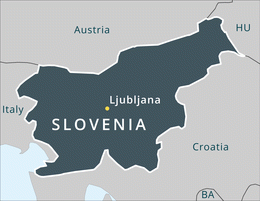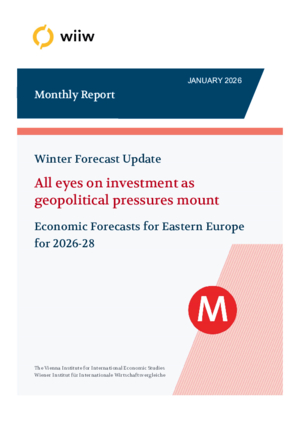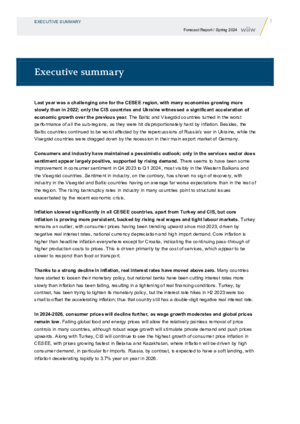Slovenia

After a slowdown in 2025, GDP growth is expected to accelerate to 2% in 2026, partly supported by favourable base effects. The acceleration will be predominantly domestic driven. Government spending will rise, marking the peak of the infrastructure investment cycle and reflecting strong absorption of EU Recovery and Resilience Facility funds. Private consumption is expected to rise moderately after what was a very sluggish 2025, despite higher earnings. Private investment is projected to resume, albeit at modest rates. Exports will again contribute positively to growth as foreign demand recovers gradually. Industrial production is forecast to increase by 2.3%. While the cyclical trough has likely been reached, energy-intensive industries will recover only slowly due to competitiveness losses linked to rising labour costs. Continued labour-market tightness will act as a constraint on growth in the services sector. In 2027, growth is expected to edge up to 2.2% on the back of a further recovery in the euro area.
| |
|
|
|
FORECAST* |
| Main Economic Indicators | 2023 | 2024 | 2025 | 2026 | 2027 | 2028 |
| Population, 1000 persons | 2120 | 2127 | . | . | . | . |
| GDP, real change in % | 2.4 | 1.7 | 0.8 | 2.0 | 2.2 | 2.1 |
| GDP per capita (EUR at PPP) | 35070 | 36120 | . | . | . | . |
| Gross industrial production, real change in % | -5.6 | -1.0 | -1.3 | . | . | . |
| Unemployment rate - LFS, in %, average | 3.7 | 3.7 | 3.7 | 3.6 | 3.5 | 3.5 |
| Average gross monthly wages, EUR | 2221 | 2395 | . | . | . | . |
| Consumer prices, % p.a. | 7.2 | 2.0 | 2.5 | 2.3 | 2.1 | 2.1 |
| Fiscal balance in % of GDP | -2.6 | -0.9 | -2.3 | -2.3 | -2.1 | -2.1 |
| Public debt in % of GDP | 68.3 | 66.6 | 65.7 | . | . | . |
| Current account in % of GDP | 4.8 | 4.5 | 3.5 | 4.1 | 4.5 | 4.8 |
| FDI inflow, EUR m | 1399 | 1722 | . | . | . | . |
| Gross external debt in % of GDP | 90.5 | 87.9 | 88.3 | . | . | . |
Basic data are continuously updated.
* Forecasts are changed beginning of January, April, July and November.
See Press Conferences.
publication_icon
Monthly Report No. 1/2026
Vasily Astrov, Alexandra Bykova, Selena Duraković, Meryem Gökten, Richard Grieveson, Maciej Grodzicki, Ioannis Gutzianas, Doris Hanzl-Weiss, Gabor Hunya, Branimir Jovanović, Biljana Jovanovikj, Niko Korpar, Dzmitry Kruk, Sebastian Leitner, Isilda Mara, Emilia Penkova-Pearson, Olga Pindyuk, Sandor Richter, Marko Sošić, Bernd Christoph Ströhm and Marina Tverdostup
wiiw Monthly Report No. 1, January 2026
58 pages including 6 Tables and 15 Figures
Details
publication_icon
Executive summary
Olga Pindyuk
in: The Crisis is Over, but its Scarring Effects are Hindering Recovery
wiiw Forecast Report No. Spring 2024, April 2024 , pp. I-VII
Details
After a slowdown in 2025, GDP growth is expected to accelerate to 2% in 2026, partly supported by favourable base effects. The acceleration will be predominantly domestic driven. Government spending will rise, marking the peak of the infrastructure investment cycle and reflecting strong absorption of EU Recovery and Resilience Facility funds. Private consumption is expected to rise moderately after what was a very sluggish 2025, despite higher earnings. Private investment is projected to resume, albeit at modest rates. Exports will again contribute positively to growth as foreign demand recovers gradually. Industrial production is forecast to increase by 2.3%. While the cyclical trough has likely been reached, energy-intensive industries will recover only slowly due to competitiveness losses linked to rising labour costs. Continued labour-market tightness will act as a constraint on growth in the services sector. In 2027, growth is expected to edge up to 2.2% on the back of a further recovery in the euro area.


